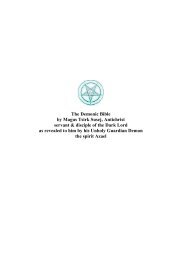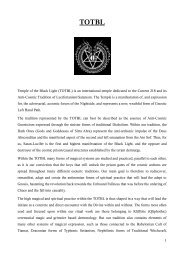Satanism Today - An Encyclopedia of Religion, Folklore and Popular ...
Satanism Today - An Encyclopedia of Religion, Folklore and Popular ...
Satanism Today - An Encyclopedia of Religion, Folklore and Popular ...
You also want an ePaper? Increase the reach of your titles
YUMPU automatically turns print PDFs into web optimized ePapers that Google loves.
128 Invitation to Hell<br />
January 3, 1996.<br />
http://members.aol.com/IngramOrg/papworth.<br />
htm.<br />
Pendergrast, Mark. Victims <strong>of</strong> Memory. 2nd ed.<br />
Hinesburg, VT: Upper Access Books, 1996.<br />
Thompson, Loreli. “Supplemental Officer’s Report.”<br />
April 20, 1989.<br />
http://members.aol.com/IngramOrg/thompson.<br />
htm.<br />
Wright, Lawrence. Remembering Satan: A Case <strong>of</strong><br />
Recovered Memory <strong>and</strong> the Shattering <strong>of</strong> an<br />
American Family. New York: Knopf, 1994.<br />
Invitation to Hell<br />
In this 1994 film, yet another family moves into a<br />
new town <strong>and</strong> stumbles onto a diabolical conspiracy,<br />
this one headed up by a demon who runs the<br />
Steaming Springs Country Club.<br />
Islam<br />
Notions <strong>of</strong> hell, demons, <strong>and</strong> Satan (Arabic Iblis)<br />
have been part <strong>of</strong> Islam since the time <strong>of</strong><br />
Muhammad. Both the Koran (the Islamic scriptures)<br />
<strong>and</strong> the Hadith (the sayings <strong>of</strong> the Prophet<br />
Muhammad), refer to these concepts. The story <strong>of</strong><br />
the origin <strong>of</strong> Satan is told somewhat differently in<br />
the Muslim tradition than in Christianity.<br />
In the Muslim account, when God created<br />
Adam, He comm<strong>and</strong>ed the angels to worship him.<br />
Iblis refused on the grounds that Adam, who, after<br />
all, was a mere creature <strong>of</strong> dust <strong>and</strong> dirt, was inferior<br />
to the angels, who were made from light. As<br />
punishment for his disobedience, Iblis was transformed<br />
from an angel into a jinn, which is a being<br />
made <strong>of</strong> fire.<br />
When the Lord said to the angels, “See, I am<br />
creating a mortal <strong>of</strong> clay. when I have shaped<br />
him, <strong>and</strong> breathed My spirit in him, fall you<br />
down, bowing before him!” Then the angels<br />
bowed themselves all together, save Iblis; he<br />
waxed proud, <strong>and</strong> was one <strong>of</strong> the unbelievers.<br />
Said he, “Iblis, what prevented thee to bow<br />
thyself before that I created with My own<br />
h<strong>and</strong>s Said he, “I am better than he; Thou<br />
createdst me <strong>of</strong> fire, <strong>and</strong> him Thou createdst <strong>of</strong><br />
clay.” Said he, “Then go thou forth hence; thou<br />
are accured. Upon thee shall rest My cures, till<br />
the Day <strong>of</strong> Doom.” (Arberry 1969, 163)<br />
Then Iblis <strong>and</strong> other angels who shared his<br />
viewpoint were removed from their stations, <strong>and</strong><br />
exiled from heaven. They subsequently became<br />
demons, with Iblis playing the role <strong>of</strong> the Islamic<br />
Satan. Ejected from the presence <strong>of</strong> God, these<br />
former angels turned to trickery <strong>and</strong> causing<br />
trouble for mortals. According to the Koran, Iblis’s<br />
first misdeed was to lead Adam <strong>and</strong> Eve astray in<br />
the Garden <strong>of</strong> Eden. The Koran also notes that at<br />
the end <strong>of</strong> time Iblis <strong>and</strong> his hosts will be tossed<br />
into hell.<br />
Muslim tradition also mentions specific “dark”<br />
angels, such as Malik, who guards hell. The Koran<br />
asserts that Malik is aided by nineteen other angel<br />
guards (sbires or zabayniya). When the sinful residents<br />
<strong>of</strong> hell beg Malik for help, he tells them that<br />
they must stay in hell forever because they denied<br />
the truth when it was once showed to them: “<strong>An</strong>d<br />
they shall call, ‘O Malik, let thy Lord have done<br />
with us!’ He will say,‘You will surely tarry . . . most<br />
<strong>of</strong> you were averse to the truth’” (Arberry 1969,<br />
205). Malik makes life even worse for them by<br />
stoking the fires <strong>and</strong> making jokes. The only relief<br />
comes for the Muslim sinners in hell who can<br />
escape such treatment by reciting “Allah, the<br />
Compassionate, the Merciful.” Malik knows that<br />
these true believers will one day be freed from hell<br />
by Muhammad.<br />
In an interesting variation on tradition, Sufis<br />
(Islamic mystics) reinterpreted Iblis’s disobedience<br />
as an act <strong>of</strong> love for God, <strong>and</strong> as an act <strong>of</strong><br />
obedience to the law that only God should be<br />
worshiped. To bow down to Adam, in other<br />
words, would have been an acknowledgment <strong>of</strong><br />
another god other than God, <strong>and</strong> thus an act <strong>of</strong><br />
idolatry—a severe sin in the Muslim tradition.<br />
Iblis, to continue this line <strong>of</strong> interpretation, was a<br />
true lover <strong>of</strong> God, <strong>and</strong> thus a Sufi. Iblis knew that<br />
the consequences <strong>of</strong> his actions would be punishment,<br />
but he preferred remaining true to his love<br />
<strong>of</strong> God (<strong>and</strong> the consequences <strong>of</strong> being<br />
condemned to hell) over being untrue to his love<br />
<strong>of</strong> God <strong>and</strong> remaining in heaven.<br />
The Koran is especially focused on the day <strong>of</strong><br />
judgement, when humankind will be bodily resurrected.<br />
When human beings die, they remain in a
















